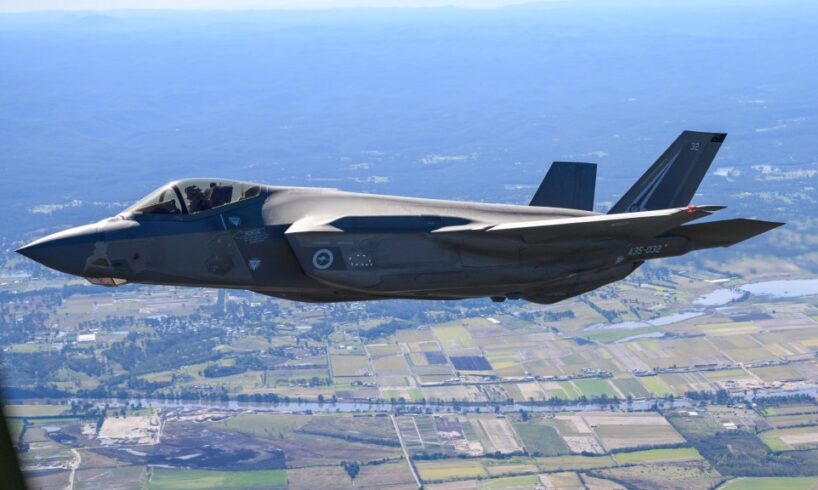
Better 148th than never, the Albanese government has sought a way out of its own Gazan wedge by making the call to recognise Palestinian statehood. This satisfies no-one, and therefore is good politics, but the bloodbath carries on. There are more real questions the government should not be allowed to ignore.
The government denied it, and kept denying it until July 28, when Foreign Affairs Minister Penny Wong stood up in the Senate and, in response to questions from Greens Senator David Shoebridge, said:
We are not supplying weapons or ammunition to Israel … I have explained to you multiple times, and yet, despite that, you continue to spread misinformation. We are part of the longstanding F-35 consortium … As part of the global F-35 supply chain, we contribute components and parts that are nonlethal in nature.
Related Article Block Placeholder
Article ID: 1217155
And there it was: we’re not supplying the guns, just the parts. In the case of the F-35 fighter jets — self-described as “the most lethal fighter aircraft in the world” — that have been bombing Gaza (and Lebanon, Yemen, Syria, Iran) for nearly two years now, we supply mechanisms that are necessary for the bomb doors to open. Nonlethal, see?
That bit of sophistry is the government’s choice, doubled down on the weekend by Defence Minister Richard Marles, who reinforced that we don’t supply weapons to Israel but that components are “a separate issue”. We’re squarely in “guns don’t kill people” territory here.
Deceitful and amoral, one might think of our government’s actions. But are they also illegal?
Independent. Irreverent. In your inbox
Get the headlines they don’t want you to read. Sign up to Crikey’s free newsletters for fearless reporting, sharp analysis, and a touch of chaos
By continuing, you agree to our Terms & Conditions and Privacy Policy.
Australia’s domestic law heavily regulates the export and sale of arms. Components for F-35s are on the list of goods whose export is prohibited unless the defence minister grants permission. To do so, Marles must be satisfied that the export “would not prejudice the security, defence or international relations of Australia”. The factors requiring consideration include whether the goods may be used to commit human rights abuses or for conflict, or are contrary to Australia’s international obligations.
In light of the government’s cautiously expanding separation from Israel, another factor is whether the goods may go to a country with policies or strategic interests inconsistent with ours. Given we’ve declared that much of what Israel is doing is illegal and wrong, this inconsistency is getting hard to ignore.
Be that as it may, Marles has approved the F-35 component sales — and he has made this decision with very broad personal discretion. There’s an arguable basis for challenging his approval in court on the basis that he’s misapplied the discretion or made a clearly irrational decision. But the courts do not like intervening in policymaking, especially on matters of international relations.
Related Article Block Placeholder
Article ID: 1217065
If Australia is breaching its treaty obligations, that only raises an issue of enforceable illegality if those obligations have been made part of our domestic law. Mostly, they haven’t.
Australia is a party to the Arms Trade Treaty, which prohibits the transfer of arms (including the F-35 parts) if we know they’ll be used in the commission of genocide, crimes against humanity or war crimes. Member countries are further obliged to continually reassess the risk of this happening in the context of ongoing supply.
The International Court of Justice (ICJ) issued its advisory opinion over a year ago, holding that Israel’s occupation of Palestinian territory was illegal (as well as finding it was “plausible” that Israel was committing a genocide). The International Criminal Court (ICC) has issued an arrest warrant against Benjamin Netanyahu on war crimes charges.
Australia is a signatory to both courts, bound to help implement and enforce their decisions. As the ICJ ruled, all member states are obligated to prevent trade relations “that assist in the maintenance” of Israel’s illegal occupation.
There’s a solid case that Australia is in breach of its treaty obligations by continuing to supply the F-35 parts that undoubtedly form a small piece of Israel’s war-making machine, without which it would far less effectively carry out its war against the Palestinian people and the crimes it is unquestionably committing in that pursuit.
There are no consequences for ignoring our obligations under international law, but by doing so, Australia is contributing to the degradation of the so-called rules-based order. That will be a shameful legacy.
Related Article Block Placeholder
Article ID: 1216788
The same questions have arisen elsewhere. In the Netherlands, the Supreme Court upheld a challenge to the government’s participation in the F-35 supply program, ruling there was a clear risk of the weapons being used for serious violations of human rights or humanitarian law. This was bolstered by the fact that European Union law — unlike ours — includes human rights protections.
The UK courts went the other way, dismissing an identical challenge to the UK’s supply of F-35 parts. In the absence of relevant domestic law obligations, the court there declined to try to determine the hotly disputed facts on the ground and left it to the politicians to do the right thing.
I expect our courts would follow the UK approach, although that’s not completely beyond doubt. However, it should not have to come to that. The question of whether any government of conscience should be sending arms to Israel right now isn’t a complicated one.
If nothing else will give Richard Marles pause for intelligent thought, perhaps this will: Article III(e) of the Convention on the Prevention and Punishment of the Crime of Genocide makes “complicity in genocide” a punishable crime prosecutable by the ICC.
If the ICJ’s finding is definitively affirmed, that Israel is in fact committing acts of genocide in Palestine, then Australia — and the individual ministers who drive its choices — would be hypothetically vulnerable to charges of complicity.
One needn’t wonder what Marles is thinking, but Penny Wong? That’s hard to understand.





